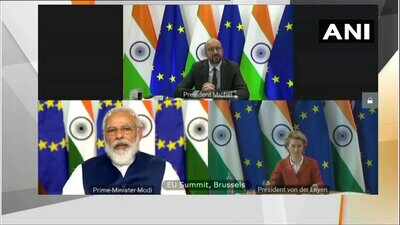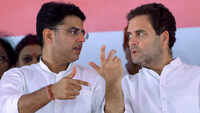
NEW DELHI: A high level trade and investment dialogue between India and EU which was set up after the first virtual India-EU summit today is expected to move to a broad-based free trade agreement that holds promise but has stalled for the past seven years.
The summit saw India and EU signing five documents — a political joint statement, EU-India strategic framework, called Roadmap 2025, an agreement for civil nuclear cooperation, renewal of science & technology agreement for 5 years and a joint declaration on resource efficiency and circular economy.
Addressing journalists in Brussels, Ursula von der Leyen European Commission president, said, “with this high level trade and investment dialogue, we hope to advance things and to promote our common interest in moving forward towards a free trade agreement.” But, she clarified, “we’re not there yet.”
Vikas Swarup, secretary (west) in MEA said in a post summit briefing that “post Covid economic recovery priorities offer opportunities to unleash the full potential for their economic ties, including discussion on supply chain linkages between India and Europe. PM invited European companies for FDI in India taking into account our efforts to improve ease of doing business, regulatory environment and our aim to integrate India with global value chains.” Swarup added India had committed to liberalise its regulatory environment.
Charles Michel, president of the European Council said the summit stressed on three areas — cooperation on combating COVID 19, and rebuilding economies post the pandemic, bilateral relations covering over 20 areas of interest and regional and security issues. He added, “we welcome India’s proposal for a connectivity partnership that is open, sustainable and rules based.” This is a direct contrast to the Chinese model of connectivity that Beijing has peddled succcessfully to many countries in Europe.
India and EU also set up a human rights dialogue, that would become the forum for discussion of issues that could derail the bilateral relationship. Asked on the CAA and Jammu & Kashmir, Michel said, “Regarding the citizenship law, you know that in the European Parliament this was an important topic. And we raised this issue in our talks. I would like to say that we trust Indian institutions. We understand the supreme court will have a role to play to assess this legislation. We took a decision with India to continue a dialogue on human rights in order to exchange best practices and have the best understanding on how to tackle this issue for India and the EU.”
India and EU also set up a Maritime security dialogue and deepened cooperation on naval cooperation.
Interestingly, the two sides set up a joint working group on artificial intelligence and 5G — an indication that India and EU may want to pool resources and technology to build trusted 5G networks and keep out Huawei and Chinese companies. European companies, Nokia and Ericsson also have 5G expertise which might come in handy here. Michel said, “EU is a partner of India’s sustainable modernisation, through investments by EIB of over 4 billion euros.”
Swarup also said India and EU also discussed India-China relations, while the prime minister briefed the European side about events on the LAC in the past months.
The summit saw India and EU signing five documents — a political joint statement, EU-India strategic framework, called Roadmap 2025, an agreement for civil nuclear cooperation, renewal of science & technology agreement for 5 years and a joint declaration on resource efficiency and circular economy.
Addressing journalists in Brussels, Ursula von der Leyen European Commission president, said, “with this high level trade and investment dialogue, we hope to advance things and to promote our common interest in moving forward towards a free trade agreement.” But, she clarified, “we’re not there yet.”
Vikas Swarup, secretary (west) in MEA said in a post summit briefing that “post Covid economic recovery priorities offer opportunities to unleash the full potential for their economic ties, including discussion on supply chain linkages between India and Europe. PM invited European companies for FDI in India taking into account our efforts to improve ease of doing business, regulatory environment and our aim to integrate India with global value chains.” Swarup added India had committed to liberalise its regulatory environment.
Charles Michel, president of the European Council said the summit stressed on three areas — cooperation on combating COVID 19, and rebuilding economies post the pandemic, bilateral relations covering over 20 areas of interest and regional and security issues. He added, “we welcome India’s proposal for a connectivity partnership that is open, sustainable and rules based.” This is a direct contrast to the Chinese model of connectivity that Beijing has peddled succcessfully to many countries in Europe.
India and EU also set up a human rights dialogue, that would become the forum for discussion of issues that could derail the bilateral relationship. Asked on the CAA and Jammu & Kashmir, Michel said, “Regarding the citizenship law, you know that in the European Parliament this was an important topic. And we raised this issue in our talks. I would like to say that we trust Indian institutions. We understand the supreme court will have a role to play to assess this legislation. We took a decision with India to continue a dialogue on human rights in order to exchange best practices and have the best understanding on how to tackle this issue for India and the EU.”
India and EU also set up a Maritime security dialogue and deepened cooperation on naval cooperation.
Interestingly, the two sides set up a joint working group on artificial intelligence and 5G — an indication that India and EU may want to pool resources and technology to build trusted 5G networks and keep out Huawei and Chinese companies. European companies, Nokia and Ericsson also have 5G expertise which might come in handy here. Michel said, “EU is a partner of India’s sustainable modernisation, through investments by EIB of over 4 billion euros.”
Swarup also said India and EU also discussed India-China relations, while the prime minister briefed the European side about events on the LAC in the past months.
Download
The Times of India News App for Latest India News

Coronavirus outbreak
Trending Topics
LATEST VIDEOS
India
 Odisha: Bhoi Sahi area in Balasore declared Covid-19 containment zone
Odisha: Bhoi Sahi area in Balasore declared Covid-19 containment zone  MP: Farmer drinks poison in front of govt officers during eviction drive
MP: Farmer drinks poison in front of govt officers during eviction drive  Dehradun: 8-month pregnant woman and 3 other killed in house collapse
Dehradun: 8-month pregnant woman and 3 other killed in house collapse  If anybody wants to leave the party they will: Rahul Gandhi
If anybody wants to leave the party they will: Rahul Gandhi  Follow all agreed protocols for border management: India to China
Follow all agreed protocols for border management: India to China  DGCA pulls up UAE carriers for violating air charter norms
DGCA pulls up UAE carriers for violating air charter norms
More from TOI
Navbharat Times
Featured Today in Travel
Quick Links
Coronavirus in MumbaiCoronavirus in KolkataCoronavirus in HyderabadCoronavirus in DelhiCoronavirus in BangaloreCoronavirus symptomsCoronavirus in IndiaWhat is CoronavirusCoronavirus NewsSolar EclipseNPRWhat is NRCCAB BillCAB and NRCRTI BillPodcast newsLok SabhaShiv SenaYSRCPCongressBJP newsUIDAIIndian ArmyISRO newsSupreme Court
Get the app



